

Prioritized Parenting Priority #1 Connection: Form a Strong Emotional Attachment 1. Create a family culture that is attachment-oriented True and lasting happiness comes only through relationships. Our “template” for relationships is first learned in the context of family life. Our attachment experiences and ability to form attachments has a profound effect on our outcome in life — it greatly influences our sense of identity, who we relate to, and what we end up valuing. If you are having a moment of doubt in parenting, choose whatever option reinforces healthy attachment! Things you can do to help… • Orient your family schedule around opportunities for attachment instead of opportunities for new activities! • Become aware of your own attachment experiences as a child and how they influence your parenting style • Develop a more explicit family culture that gives your child a sense of identity from which to form themselves Book Recommendation: Hold on To Your Kids by Gabor Mate and Gordon Neufeld 2. Stay connected. Most of the phases of childhood can often be messy and can feel very disempowering for parents, especially as their children begin to individuate. But they still need your understanding, unconditional love, and yes, guidance. As teens explore try out new identities, who they are to their parents is important to them (even if they don’t act that way). They need just as much of you as ever, even if it is in small doses. Things you can do to help… • Find new ways to connect with your teen during these years. • Even though they get so annoyed when you ask about their lives, it is a much worse fate for them to feel ignored or forgotten about. • Talk with them about things other than school, chores, and going to be on time! Book Recommendation: The Five Love Languages of Children by Gary Chapman
Priority #2 Control: Help Them Learn to Control the One Thing They Can: Themselves 1. Develop the ability to delay gratification. The ability to delay gratification (putting off something that is good now for something better later on) has been found to be more predictive of success in life than IQ. Also, unlike IQ, you can significantly improve your ability to delay gratification. Look up Walter Mischel and the Marshmallow Experiment on YouTube. Things you can do to help… • Help your kids identify their goals and the steps it takes to reach them • Encourage self-control in eating, school work, and other responsibilities • Model self-control in your own life • Let them learn the hard way! Book Recommendation: How Children Succeed by Paul Tough 2. Foster a sense of self-efficacy. Self- efficacy refers to a person’s belief in his or her capacity to behave in such a way to accomplish a goal. Self-esteem in itself is insufficient for either happiness or success, and self- efficacy helps to ground how you feel about yourself in reality. Self-efficacy reflects confidence in the ability to exert control over one's own motivation, behavior, and social environment. These cognitive self-evaluations influence all manner of human experience, including the goals for which teens strive, the amount of energy expended toward goal achievement, and likelihood of attaining particular levels of behavioral performance. Things you can do to help… • Give them opportunities for mastery (both in and out of school) • Help them think both positive and accurately about themselves • Stand beside them as they persevere through the ups and downs of success and failure Book Recommendation: Childhood Roots of Adult Happiness by Dr. Edward Hallowell Priority #3 Contentment: Teach Them a Recipe for Happiness that will Actually Work 1. Help them clarify the values that will drive their life. Personal identity is the starting point, delay of gratification is the vehicle for the journey, and happiness is the destination. We are all pursuing happiness, but many people never clarify for themselves what happiness means to them.
As teens develop their identity, they begin to formulate the values and principles that will guide their decisions. Making this search explicit can help them be more aware of the values they choose, and thus more likely to choose values that lead to fulfillment. Things you can do to help… • Have grown up discussions about their priorities that are open and not judgmental • Help them learn to see the outcomes of their actions and how it makes them feel • From early on in their childhood, be explicit about what your family values are. Being too “pushy” about your values can backfire, especially if you don’t actually live them, but teaching them your values and being true to them sets an example for your children on how to Book Recommendation: The 6 Most Important Decisions You’ll Ever Make by Sean Covey 2. Teach conscience. Even though they don’t always act like it, by the time they are teens, kids usually have internalized the moral values that you have tried to teach them. In adolescence, the teen brain is prepared to move away from rule-based morality to a morality where you do the right thing because it is the right thing to do. Because they can now think abstractly and reflect upon themselves, they can begin to form a conscience. Things you can do to help… • Don’t do their thinking for them, and rather than just telling them what to do, help them come to the realization for themselves by asking the right questions • Keep in mind the principle that you are not raising kids, you are raising adults — that is, you want your children to learn to think for themselves and be responsible Book Recommendation: The 7 Habits of Highly Effective Teens by Sean Covey If you have any questions, Jim can be reached at drjimlangley@gmail.com
Recommend
More recommend